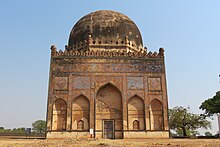Alau'd-din Ahmad Shah
| Alau'd-din Ahmad Shah | |
|---|---|
Bahmani tombs | |
| Issue | Humayun Shah Hasan Khan Yahya Khan |
| Father | Ahmad Shah I Wali |
| Religion | Islam |
Alau’d-din Ahmad Shah was the tenth sultan of the Bahmani Sultanate. He was considered a benevolent ruler, albeit weak in administration.[1][2] His reign is marked by rebellions.
The rift between the Dakhanis, or old-comers, and Afaqis, or new-comers[note 1] worsened during his reign.
Early life
Alauddin was the eldest son of Ahmad Shah I Wali.
During his father's reign, Alauddin participated in military campaigns.[citation needed]
Reign
Upon his coronation, he assumed the title of Alauddin Ahmad Shah.
Vijayanagara campaign and the rebellion of Muhammad Khan
The first major military campaign during Alauddin's reign began against Vijayanagara, over the non-payment of tribute by Deva Raya II. Alauddin deputed his brother Muhammad Khan to demand tribute by force. This venture was successful and Deva Raya sent "eight lacs of huns, twenty elephants and two hundred girls adept in the arts of dance and song".
During his return from Vijayanagara, Muhammad Khan launched a rebellion against the sultan on the premise that according to the will of Ahmad Shah, Alauddin and Muhammad were designated to rule the kingdom jointly. Muhammad Khan captured several forts including Raichur, Mudgal and Solapur.
He fled to the jungle and was pursued by Alauddin's soldiers, who had express orders not to harm the prince. Muhammad was pardoned and awarded the jagir of Rajachal.

Khandesh campaign
Second Vijayanagara campaign
Alauddin himself commanded the army at Mudgal. A peace treaty was signed and the arrears of tribute were paid in full.
Chakan massacre
Mushir ul Mulk besieged the Afaqis in the fort of Chakan. He informed the sultan that they had insulted the king. Alauddin ordered the execution of all of them.
They lured the Afaqis into the camp, and massacred practically all of them, including many Sayyids.[3]
The king removed Dakhnis from office, including Prime Minister Mian Minallah.
The massacre further strained Dakhni-Afaqi relations.
Rebellion of Jalal Khan
In 1455, Jalal Khan, a brother-in-law of Alauddin and the jagirdar of Nalgonda, declared himself king. This was due to a rumour of Alauddin's death as he had been suffering from a wound on his shin.[4] Alauddin marched on Nalgonda, and Jalal's son Sikandar enlisted Mahmud Khalji to join their rebellion. In 1456, Mahmud invaded Berar.[5]
At Mahur, Alauddin commanded a force of 180,000 men. He divided his army into three contingents. Faced with an army thrice the size of his own, Mahmud Khalji withdrew leaving behind a token force of 1000 men.
Mahmud Gawan was put in charge of suppressing the revolt. Jalal was pardoned by the sultan and allowed to retain Nalgonda.[6]
Public works and social welfare
Alauddin is credited with building a large hospital at Bidar. He endowed several villages, the revenue from which would fund the hospital.[7][8]
Death and succession
Alauddin died on 3 April 1458, from the malignant wound on his shin.
Personality

Alauddin was described as a benevolent ruler, but weak in administration.
Family
Wives
- Agha Zainab, daughter of Nasir Khan of Khandesh
- Ziba Chihra, daughter of the Raja of Sangameshwar
Issue
References
- ^ Sherwani 1946, p. 223.
- ^ Yazdani 1947, p. 130.
- ^ Haig 1925, p. 405.
- ^ Sherwani 1946, p. 243-244.
- ^ Haig 1925, p. 409.
- ^ Sherwani 1946, p. 245.
- ^ Sherwani 1946, p. 227-228.
- ^ Haig 1925, p. 407.
- ^ Sherwani 1946, p. 257, 262-263.
- ^ Sherwani 1946, p. 257.
Notes
Citations
Bibliography
- Haig, Wolseley, ed. (1925). The Cambridge History of India Vol. II: Turks and Afghans. Cambridge University Press.
- Yazdani, Ghulam (1947). Bidar, Its History and Monuments. London: Oxford University Press.
- Sherwani, Haroon Khan (1946). The Bahmanis of the Deccan. Hyderabad.
{{cite book}}: CS1 maint: location missing publisher (link)
